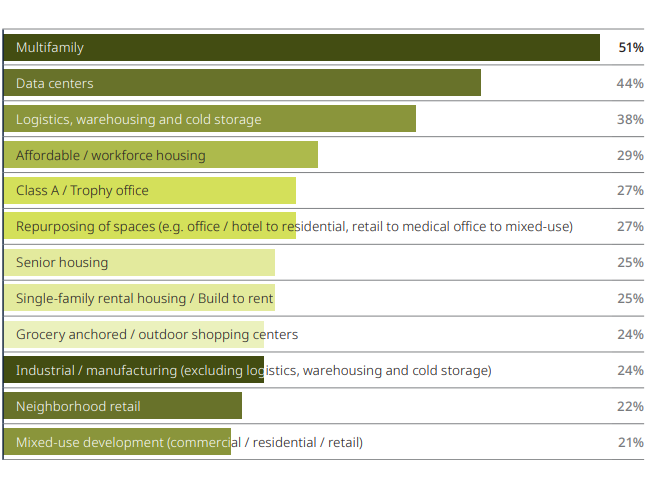Deloitte’s 2024 CRE Outlook
Executives around the world shared worries, insights and a few surprises in the firm's annual survey, according to columnist John D'Angelo.
I’ve said it before, but it bears repeating: One of my favorite parts of my job is that my heightened sense of curiosity is continuously satisfied in the work that I do. As you may recall, Deloitte conducts an annual survey of commercial real estate firms and compiles and publishes the results in its CRE outlook. This year, Deloitte surveyed 750 global real estate owner, operator and investor company CFOs from around the globe, asking questions on topics from growth prospects to worries to tech trends.
Some themes in that report that stood out for me are firms’ general pessimistic expectations for revenue, their deep concerns about cybersecurity, and technical debt that real estate firms simply don’t seem able to shake. Also, the majority of those surveyed still don’t think they’re in good shape with respect to ESG reporting. Finally, the survey found that firms have been actively embracing emerging technologies, although this doesn’t reconcile with our experience.
Poking into the first theme about revenue pessimism, 60 percent of those surveyed expect revenue to decline for the remainder of 2023, up from 48 percent last year. In turn, 40 percent expect to actively reduce spending into 2024, compared with only 6 percent planning to do so last year. North American respondents expect to achieve cost reductions primarily through headcount (49 percent) and secondarily through reduced office footprint (46 percent).
READ ALSO: What CRE Needs to Know About GenAI
In response to, “What are the biggest threats to your company’s financial performance in the year ahead?” the top answer was cyber threats. In North America, the next three issues real estate firms face were climate-related regulatory action, sustained high inflation and cost of capital. Interestingly, actual climate-related risk ranked down in the bottom third of threats across all geographies. The great resignation—or great reshuffle—of 2020 and 2021 seems to have died down, as talent retention was also in the bottom third across geographies. And short-term liquidity was the number one threat reported from those surveyed in the Asia-Pacific region, while it is near the bottom of the list for those in North America.
Unsurprisingly, when Deloitte asked about threats to property fundaments, respondents cited cost of capital and availability of capital as the two most significant threats in the year ahead. Roughly 75 percent of respondents expected both to either worsen or stay the same in 2024. In fact, respondents were the most pessimistic about real estate fundamentals in the year ahead than in any previous CRE survey Deloitte has conducted. Yikes!
One statistic that continues to trouble me is that nearly 60 percent of respondents said they do not have the data, processes and internal controls necessary to comply with sustainability-related regulations and expect it will take significant effort to reach compliance. My inconvenient truth to those of you who aren’t prepared: ESG reporting requirements are only getting more voluminous and rigorous, and you’re not going to be able to opt out. Now that the burden of capturing data and reporting on performance has firmly reached the CFO’s office, we are seeing a significant shift in how companies are taking action to get their act together. And by the time you read this, the SEC may have clarified and communicated public company reporting requirements, which should also help spur action.
In next month’s column, I’ll focus on technology trends. Spoiler alert, results are mixed, with only 40 percent reporting that they are either fully or mostly on “modernized” core systems, but a whopping 72 percent said they are working on or in production with some form of AI solution. Tune in next month for more.
John D’Angelo is a managing director with Deloitte and is the firm’s real estate solutions leader, designing solutions to address client challenges and push the industry forward. With more than 30 years of experience as a management consultant to the global real estate industry, John has helped some of the biggest names in real estate leverage technology and use data to optimize and transform their operations.










You must be logged in to post a comment.